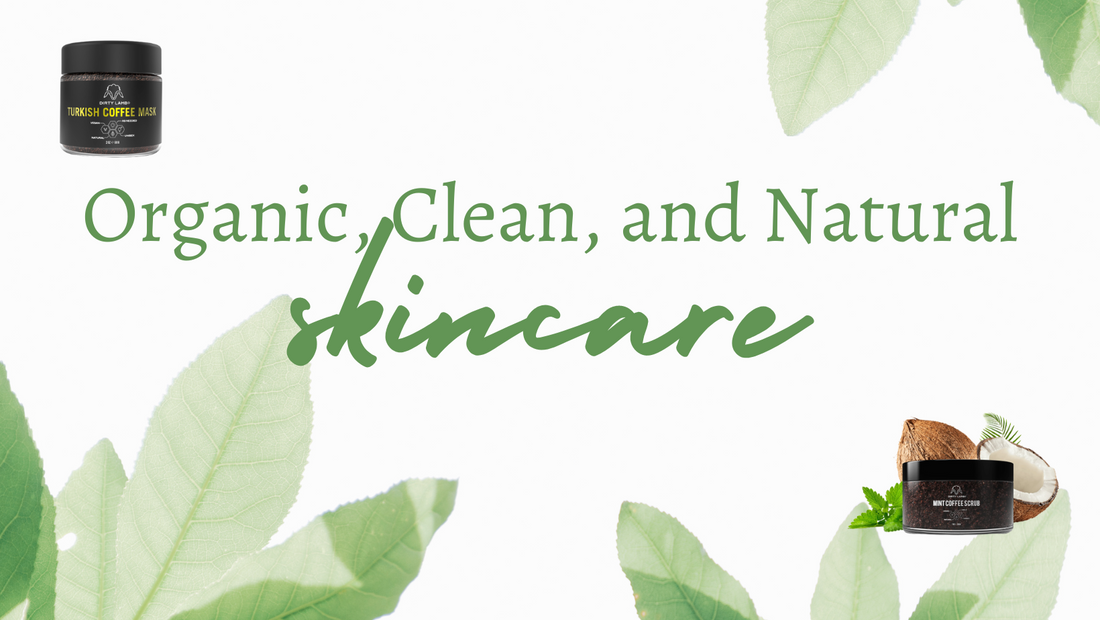Nowadays, the buzzwords “organic”, “clean”, and “natural” are used so often in the health and beauty world that after a while they almost lose meaning. However, the most difficult part is that it’s very difficult to have a straightforward definition or understanding of any of them.
As consumers, we want to have skincare products that are effective and safe for us to use — but how do we comb through all the “green” marketing to actually find those products? At Dirty Lamb, we did the research — and created those products — so you don’t have to look any further. FYI - the terms organic, natural, and clean/non-toxic are not interchangeable.
The Difference Between Organic, Natural, and Clean Skincare
Organic: Made without chemical additives (like GMOs and pesticides)
Natural: Used ingredients sourced from nature
Clean/Non-Toxic: Free from ingredients associated with toxic responses in humans
Organic Skincare:
“Organic strictly refers to ingredients grown without the involvement of pesticide, artificial fertilizers, and any other synthetic ingredient.” Of all the terms, “organic” is the most regulated of them all. In order to be considered organic, a product needs to be made with at least 95% synthetic-free ingredients. The FDA highly regulates the term “organic” under the Federal Food, Drug, and Cosmetic Act and the Fair Packaging and Labeling Act. USDA-certified organic beauty products have to be certified by an accredited agent, meaning any product with that certification is made from ingredients that were produced, handled, and packaged to the proper standards. While “organic” is the word that carries the most meaning, that’s only when it comes with an official certification.
Natural Skincare:
Natural skincare is defined as using ingredients that are produced in nature (like water, a plant, or even the coconut oil found in our Mint Coffee Scrub). There are zero regulations around the term and many skincare and beauty companies use it quite loosely. Just because a company claims their products are natural, does not mean they are made with only natural ingredients, and it does not mean that the product has been inspected, tested, or certified in any way. For example, a product can merely contain water and the company can label it as natural, regardless of any other ingredients that have been added to the formula. This means that no matter how many questionable or harmful ingredients are found inside the formula of a product, the company can technically call it a natural product. Many companies in the industry use the term “natural” as a clever marketing tactic.
At Dirty Lamb, all our products have the full ingredient list on the website, using actual natural formulas and ingredients. Check out our Turkish Coffee Mask, made with 100% natural Turkish coffee powder and turmeric.
Clean or Non-Toxic Skincare:
Even though the term “clean” isn’t strictly regulated by the FDA either, it does carry more weight than “natural". Many equate the term “clean” with safe cosmetics and it’s often used interchangeably with the label “non-toxic.” While “natural” skincare focuses on the ingredients in the formula, clean skincare focuses on what is not in the formula as well as the product’s environmental impact. The definition, however, changes depending on what each individual brand considers to be “clean”. Some brands will even go so far as to use minimal or biodegradable packaging for their products.
Typically, clean beauty includes a long list of “free from” ingredients” toxins and questionable ingredients the products are formulated without, like sulfates and parabens. And since the FDA has only banned 11 chemicals in the cosmetic industry, it’s up to brands and consumers to define clean for themselves.
At Dirty Lamb, we formulate our products with clean, non-toxic, non-comedogenic ingredients. They are all made without synthetic fragrances, sulfate detergents, paragons, urea, DEA, TEA, fillers, or phthalates. Our products are dermatologist tested, cruelty free, and vegan.
Check out our Tea Tree Wand that is clean/non-toxic. Under the ingredients tab, you can clearly see what is in the formula and what it is made without.
Which is right for me?
Like we mentioned earlier, most of us want skincare that’s safe for our bodies while also delivering the results we’re after. Unfortunately, simply scanning labels found on packaging isn’t enough. We recommend you research the brand, read the ingredient label, and check out any certifications the product may have to help you make the best decision for your skin.
If vegan skincare is important to you too, check out our holiday products that are made with natural, organic ingredients and are completely vegan.





